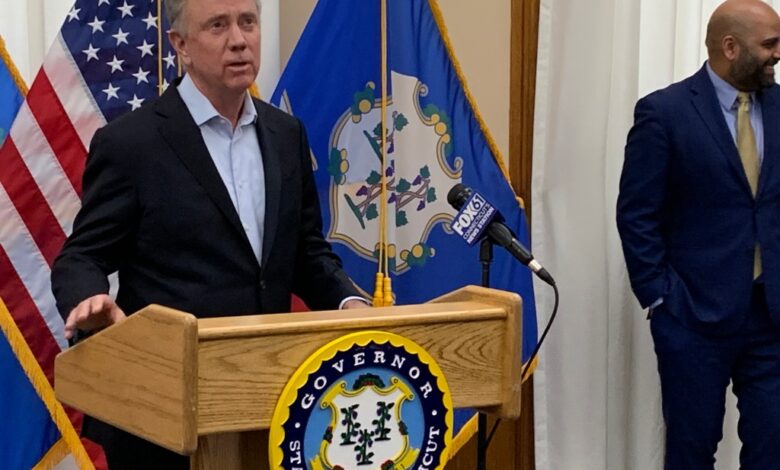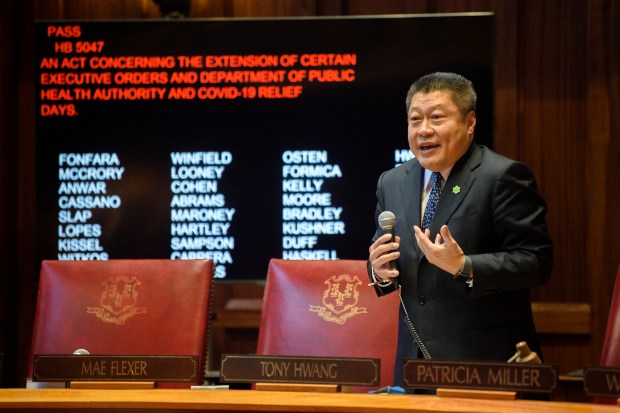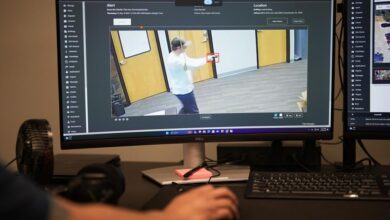CT senators call for regulating artificial intelligence

Trying to regulate the fast-moving world of artificial intelligence, the state Senate was still debating Wednesday night on a sweeping bill that creates a framework designed to help consumers and avoid the downsides of AI
Lawmakers have struggled for months in a balancing act to try to foster regulation at the same time as some officials are concerned about restricting the growth of artificial intelligence that can be used to make progress in a wide variety of fields, including health care.
As the bill has been crafted over the past two years with the help of a task force, one of the highest-profile issues has been to make it a crime to spread pornographic material that was generated by AI. Known as “deep fakes,” the images are generated by AI through videos and other means that would take a person’s image and distort it in a false way. False images were spread on the internet of famed singer Taylor Swift, which gained widespread attention. The same methods, however, can be used against average citizens and spread publicly as “revenge porn.”
The 53-page bill expands criminal laws that would now include “deep fakes” as the measure establishes “a new crime of unlawful dissemination of a synthetic intimate image” and prohibits anyone “from distributing any deceptive media before an election or primary.”
The measure requires the developers of artificial intelligence “to use reasonable care to protect consumers from any known or reasonably foreseeable risks of algorithmic discrimination” based on factors like age, religion or ethnicity, according to a nonpartisan bill summary.
The bill grants authority to the state attorney general to enforce the provisions of artificial intelligence.
Senate Democrats said they had made compromises to address the concerns of Gov. Ned Lamont, small businesses, and the state Department of Economic and Community Development that are concerned about keeping a business-friendly atmosphere for technology companies in Connecticut.
With only two weeks left in the legislative session that ends on May 8, lawmakers said they needed to take action. The measure also requires approval by the state House of Representatives and Lamont.
Sen. James Maroney, a Milford Democrat, has spearheaded various versions of the legislation as the co-chairman of the general law committee and is seen as the legislature’s leading expert on the topic.
“We want to use AI for good,” Maroney said. “We’re trying to incentivize good behaviors.”
Among various aspects in the multifaceted bill, the measure would regulate AI algorithms that are already in use, unbeknownst to some consumers, in issues like generating a person’s credit score and health care data.
The state economic development department will be directed to oversee competitive grants for use in courthouses, prisons, schools, hospitals, fire departments, and nonprofits.
Kissel calls for veto
Sen. John Kissel of Enfield, the longest-serving Senate Republican, said he would vote against the measure and called upon Lamont to veto the measure if it reaches his desk.
“This is a bad bill for Connecticut, and it’s a bad bill for business in Connecticut,” Kissel said on the Senate floor. “When we talk about artificial intelligence, let’s not get scared about that. … Yes, it’s moving fast, but we shouldn’t freak out about it. … There’s no rush on this.”
In a stentorian stemwinder citing Sir Isaac Newton, gravity, calculus, geometry, data privacy, trains, online gambling, homelessness, aerospace, and Buffalo Wild Wings, Kissel said, “We’re just talking about computer programs.”
Like Kissel, state Sen. Lisa Seminara of Avon questioned the impact of the bill.
“Is this bill still a work in progress?” Seminara asked on the Senate floor. “Is this being hastily done?”
Sen. Tony Hwang, a Fairfield Republican who served on the 21-member task force that issued a 255-page report, said powerful computers are already having an impact on Americans’ lives. AI will be involved in “potentially how we shop … potentially who we get our news from” in daily life, he said.
“It’s not a movie. It’s real,” Hwang told his Senate colleagues. “It’s on the tip of everybody’s mind. … I’m inclined to just take a step back — to reduce the complexity. Simplifying this process would allow us to create better policy. … AI is everywhere around us. It’s undeniable. … I’m trying to understand this better. … Why the rush?”
Lawmakers focused on regulating “high-risk AI systems,” which covers any system that makes an important decision about someone’s life.
“If we get it wrong in a technology field that is moving at remarkable speed … for many businesses, it’s life or death,” Hwang said. “They may leave the state or they may do the wrong thing and lose their business. … The technology changes minute by minute, not day by day. This technology is changing so fast. Are we catching the tail end?”
He added that it is “dangerous” to give too much power on the issue to the state attorney general, which is an elected position every four years.

Mark Mirko/The Hartford Courant
Sen. Tony Hwang, a Fairfield Republican, said the sweeping bill on artificial intelligence is multi-faceted and complex.
Sen. Eric Berthel, a Watertown Republican, said the state needs to stay ahead of the curve in an emerging technology.
“A.I. is already important in some aspects of the delivery of health care,” Berthel said. “As AI moves across the world, we want to make sure that Connecticut remains on the cutting edge.”
The debate started at around 3:45 p.m. Wednesday and was continuing more than two hours later.
Senate majority leader Bob Duff, a Norwalk Democrat, said recently that lawmakers need to learn from the hands-off philosophy that Congress and others took with the internet in the 1990s because they were afraid that they could block the growth of an emerging technology.
“Our job here is not to repeat the sins of the past,” Duff said recently. “Our job is to make sure that we are putting the necessary guidelines and guardrails (and) parameters around this technology now. … We shouldn’t be afraid to embrace this technology, but we also should not be afraid to put the rules of the road on there. I think that will actually help our state and help our country.”
Courant staff writer Alison Cross contributed to this report.
Christopher Keating can be reached at ckeating@courant.com



